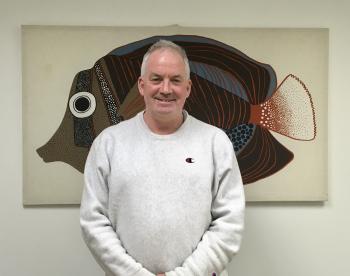Philip Powell

Strengthening Community Resilience in America’s Oldest Seaport
In partnership with the Northeast Fisheries Science Center, these oral history recordings capture the invaluable life experiences of long-lived members of Gloucester's working waterfront, one of the oldest fishing communities in the United States.
On January 29, 2020, Molly Graham interviewed Philip Powell for the Strengthening Community Resilience in America’s Oldest Seaport project. Philip Powell was born on June 11, 1965, in Woburn, Massachusetts. His family moved to Swampscott, Massachusetts, where he currently resides. Powell's father, born in Somerville, Massachusetts, in 1935, immigrated from Poland. His mother’s family came to the United States from Germany in 1941, settling in Winthrop, Massachusetts. Powell’s early life involved extensive outdoor activities, including family fishing trips and camping. His father, a banker by profession, introduced him to fishing, a passion that Powell pursued from a young age. Powell began working various jobs during high school, including fishing with local fishermen Gordon Nichols and Bob Grimes. He eventually bought his first boat at age nineteen, a thirty-seven-foot Maine-built vessel, marking the start of his career as a professional fisherman. Powell married Sally, whose family immigrated from Canton, China, and they have two children. Throughout his career, Powell adapted to changes in the fishing industry, transitioning between lobster fishing and gillnetting. He invested in multiple fishing permits and boats to sustain his livelihood despite regulatory changes and challenges within the industry. Powell's commitment to fishing extended beyond his own practice, as he became involved in community efforts to support and advocate for fishermen's rights. The oral history interview with Philip Powell, conducted by Molly Graham on January 29, 2020, in Gloucester, Massachusetts, explores Powell’s life from his early years to his career in the fishing industry. The interview begins with Powell recounting his family background, including the immigration stories of his paternal and maternal grandparents from Poland and Germany, respectively. He details his upbringing in Swampscott, Massachusetts, his father's influence in introducing him to fishing, and his experiences growing up in a supportive neighborhood despite his parents' divorce. Powell describes his entry into professional fishing, starting with part-time jobs in high school and purchasing his first boat at nineteen. He elaborates on his early fishing endeavors, working with Gordon Nichols and Bob Grimes, and his transition to owning and operating multiple fishing vessels. Powell reflects on the regulatory changes in the fishing industry, such as days-at-sea restrictions and area closures, and how these impacted his operations and required him to adapt by acquiring additional permits and boats. The interview also touches on Powell's personal life, including his marriage to Sally, the birth of their children, and the support from his in-laws in raising their family. Powell discusses the challenges of balancing family life with the demanding nature of his profession and the shifts he made in his fishing practices to accommodate his family responsibilities. Additionally, Powell addresses the broader community support for fishermen, his involvement in advocacy efforts, and the ongoing struggles faced by the fishing industry in maintaining sustainable practices and securing fair regulations.
Please Note: The oral histories in this collection are protected by copyright and have been created for educational, research and personal use as described by the Fair Use Doctrine in the U.S. Copyright law. Please reach out Voices@noaa.gov to let us know how these interviews are being used in your research, project, exhibit, etc. The Voices staff can help provide other useful resources related to your inquiry.
The NOAA mission is to understand and predict changes in climate, weather, oceans, and coasts, to share that knowledge and information with others, and to conserve and manage coastal and marine ecosystems and resources. The Voices Oral History Archives offers public access to a wide range of accounts, including historical materials that are products of their particular times, and may contain offensive language or negative stereotypes.
Voices Oral History Archives does not verify the accuracy of materials submitted to us. The opinions expressed in the interviews are those of the interviewee only. The interviews here have been made available to the public only after the interviewer has confirmed that they have obtained consent.
